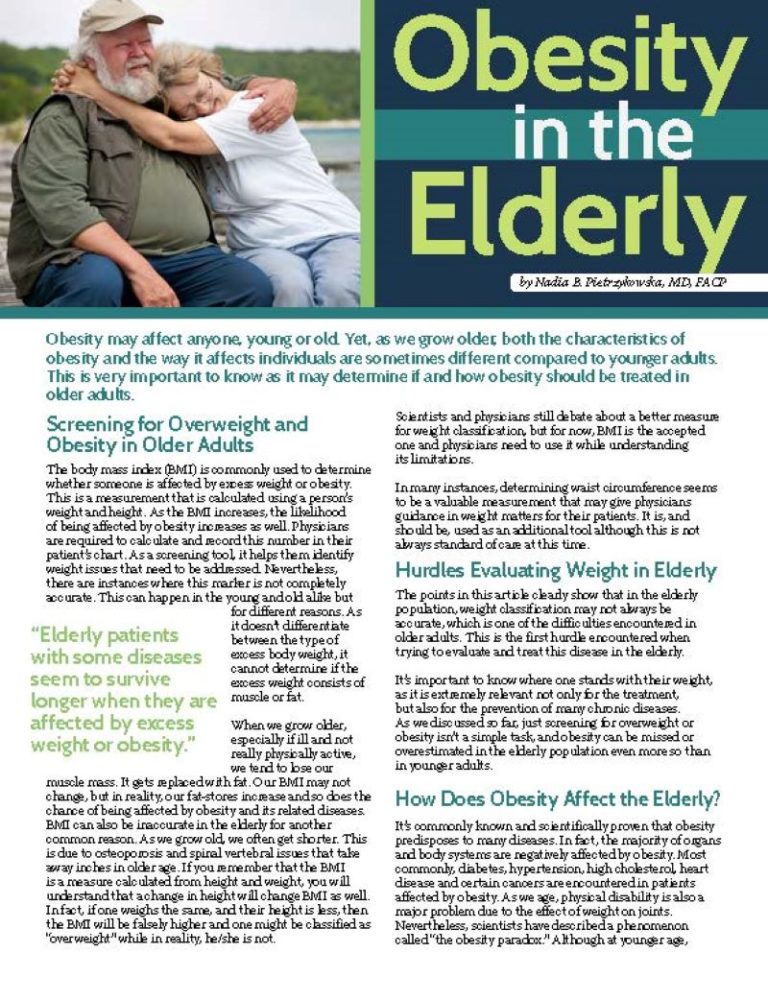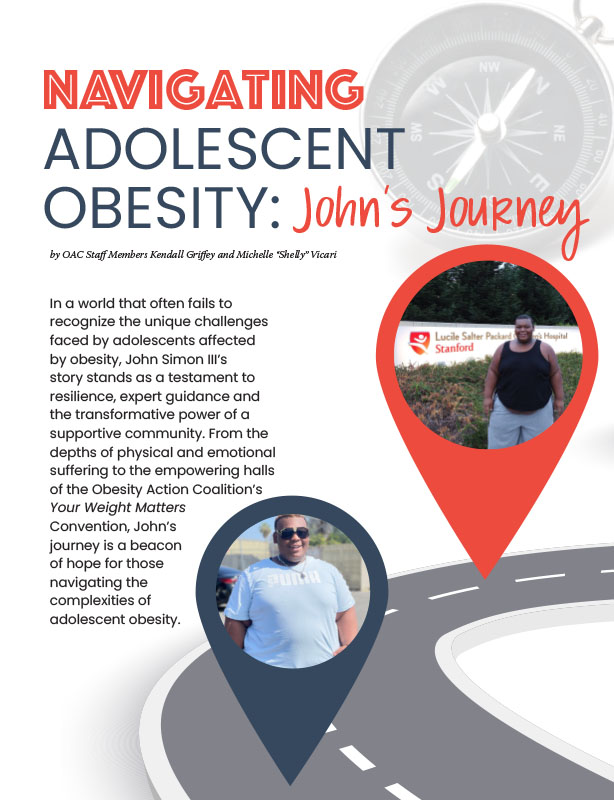Obesity in the Elderly


by Nadia B. Pietrzykowska, MD, FACP
Spring 2014
Obesity may affect anyone, young or old. Yet, as we grow older, both the characteristics of obesity and the way it affects individuals are sometimes different compared to younger adults. This is very important to know as it may determine if and how obesity should be treated in older adults.
Screening for Overweight and Obesity in Older Adults
The body mass index (BMI) is commonly used to determine whether someone is affected by excess weight or obesity. This is a measurement that is calculated using a person’s weight and height. As the BMI increases, the likelihood of being affected by obesity increases as well. Physicians are required to calculate and record this number in their patient’s chart. As a screening tool, it helps them identify weight issues that need to be addressed. Nevertheless, there are instances where this marker is not completely accurate. This can happen in the young and old alike but for different reasons. As it doesn’t differentiate between the type of excess body weight, it cannot determine if the excess weight consists of muscle or fat.
When we grow older, especially if ill and not really physically active, we tend to lose our muscle mass. It gets replaced with fat. Our BMI may not change, but in reality, our fat-stores increase and so does the chance of being affected by obesity and its related diseases. BMI can also be inaccurate in the elderly for another common reason. As we grow old, we often get shorter. This is due to osteoporosis and spinal vertebral issues that take away inches in older age. If you remember that the BMI is a measure calculated from height and weight, you will understand that a change in height will change BMI as well. In fact, if one weighs the same, and their height is less, then the BMI will be falsely higher and one might be classified as “overweight” while in reality, he/she is not. Scientists and physicians still debate about a better measure for weight classification, but for now, BMI is the accepted one and physicians need to use it while understanding its limitations.
In many instances, determining waist circumference seems to be a valuable measurement that may give physicians guidance in weight matters for their patients. It is, and should be, used as an additional tool although this is not always standard of care at this time.
Hurdles Evaluating Weight in Elderly
The points in this article clearly show that in the elderly population, weight classification may not always be accurate, which is one of the difficulties encountered in older adults. This is the first hurdle encountered when trying to evaluate and treat this disease in the elderly.
It’s important to know where one stands with their weight, as it is extremely relevant not only for the treatment, but also for the prevention of many chronic diseases. As we discussed so far, just screening for overweight or obesity isn’t a simple task, and obesity can be missed or overestimated in the elderly population even more so than in younger adults.
How Does Obesity Affect the Elderly?
It’s commonly known and scientifically proven that obesity predisposes to many diseases. In fact, the majority of organs and body systems are negatively affected by obesity. Most commonly, diabetes, hypertension, high cholesterol, heart disease and certain cancers are encountered in patients affected by obesity. As we age, physical disability is also a major problem due to the effect of weight on joints. Nevertheless, scientists have described a phenomenon called “the obesity paradox.” Although at younger age, overweight and obesity are clearly associated with a shorter lifespan, it seems that at older age, this is not always true. Some studies have shown that the “ideal” protective weight might be higher in the older population.
Elderly patients with some diseases seem to survive longer when they are affected by excess weight or obesity. The debate is ongoing in the scientific world about whether this is a real phenomenon and if so, what could explain it. Some suggest that the statistics are such only due to the fact that as adults age, those “susceptible” to the harmful effects of obesity may have already succumbed to diseases. Therefore, the elderly population affected by obesity is represented by people that are “resistant” to the negative effects of obesity. To better understand this, let’s make an analogy with smoking and lung cancer.
Smoking and Lung Cancer
You may sometime hear about grandpa that smoked all his life and is still doing just fine. It doesn’t mean that smoking does not affect people’s health. While everybody else has died from cancer or other lung diseases at a younger age, grandpa is now older and doing well while still smoking like a chimney, as he may just happen to have a sort of resistance to the harmful effects of smoking. This may explain the “obesity paradox” and why some older adults affected by obesity seem to do better than their normal weight counterparts. This said, there is no final word on whether overweight and obesity are protective in the older population and more studies are needed. Nevertheless, reluctance is sometimes seen in implementing weight-loss regimens in the elderly, and it may be due at least in part to these uncertainties.
Obesity also affects cognition, which includes the way we process information, memory, comprehension, problem solving and decisions. These functions are known to deteriorate with age and studies show that they deteriorate more rapidly in the population affected by obesity. Since proper cognition help the elderly live fuller and more independent lives, this effect of obesity is more relevant than ever with older age.
Obesity has also been clearly linked to a lesser quality of life. This becomes even more relevant in the aging adult. Generally, the elderly are already burdened by multiple predicaments that decrease their quality of life. Obesity only adds an additional burden.
Is Weight-loss Beneficial in the Older Population?
Well, it depends. Weight-loss that is not planned is not uncommon. The elderly are often sicker and need longer periods of time to recover from illness than younger adults. This often results in weight-loss. This type of weight-loss is not healthy. A significant portion of weight lost during illness is muscle loss.
A critically ill person that has to stay in the Intensive Care Unit would burn muscle during the disease process much more than expected regardless of the degree of obesity. This is a very interesting study area for many scientists interested in nutrition. In addition, even if not very severe, any illness resulting in unplanned weight-loss will decrease muscle mass. Therefore, it is important to pay close attention to rehabilitation and proper nutrition during and after an illness, especially in the elderly that already have lesser muscle reserves.
What about Planned Weight-loss?
Any intentional weight-loss results not only in the loss of fat, but also muscle. This is especially relevant in the elderly as they have less muscle and more fat as a result of normal aging and often deconditioning. Nevertheless, there seems to be a consensus that a moderate weight-loss of 5-10 percent results in significant health benefits. Moreover, some studies show that even a weight loss of 3 percent in older adults significantly improves inflammation, blood pressure, cholesterol and blood sugar.
Taking into account the mentioned benefits, planned and supervised weight-loss should be considered in older adults.
How Can an Older Adult Lose Weight Safely?
The guidelines are not really different whether weight-loss concerns younger or older adults. First, lifestyle changes are advised, including diet and exercise. In practice, not only calorie restriction but paying close attention to diet composition and an adequate amount of protein in the diet is recommended by many experts. This should always be done under the supervision of experienced physicians to ensure that no harm is done. Also, to counteract muscle loss due to aging, the American College of Sport Medicine guidelines recommend resistance training with muscle-strengthening exercise twice a week. In addition flexibility and balance exercises may be helpful in those at risk for falls. But keep in mind that any exercise regimen needs to be prescribed by a physician to ensure patient safety. In addition, older adults are commonly taking multiple medications. It’s important that physicians take a close look and replace any medications that are known to cause weight gain with other alternatives whenever possible.
Weight-loss medication choices are more limited in older adults. This shortens the list of available medications for weight-loss. Side effects, existing medical conditions and interactions with other medications are the major barriers in prescribing weight-loss medications in the elderly. Bariatric surgery is being increasingly considered in older adults as well. The existing medical problems, surgical risk and benefits from the surgery need to be closely analyzed by the medical team and discussed with the patient to ensure an optimal decision and a satisfactory outcome.
Conclusion
As adults age, it is important to ensure that they not only live longer, but that their lives are fulfilling and lived in dignity with as much independence as possible. While excess weight affects individuals at all stages of life, we should acknowledge its increasing impact as we age and shouldn’t ignore the significant benefits of its treatment later in life.
About the Author:
Nadia B. Pietrzykowska, MD, FACP, is a Board Certified and fellowship trained Obesity Medicine Specialist, Physician Nutrition Specialist and Health Coach. She is the Founder and Medical Director of “Weight & Life MD,” a Center for Healthy Weight, Nutrition and Lifestyle opening soon in New Jersey.
by Nina Crowley, PhD, RD (with Inspiration from Shawn Cochran) Winter 2024 Dating, no matter your age,…
Read Articleby Leslie M. Golden, MD, MPH, ABOM Diplomate Winter 2024 The journey to overcoming obesity is a…
Read Articleby OAC Staff Members Kendall Griffey and Michelle “Shelly” Vicari Winter 2024 In a world that often…
Read Article








